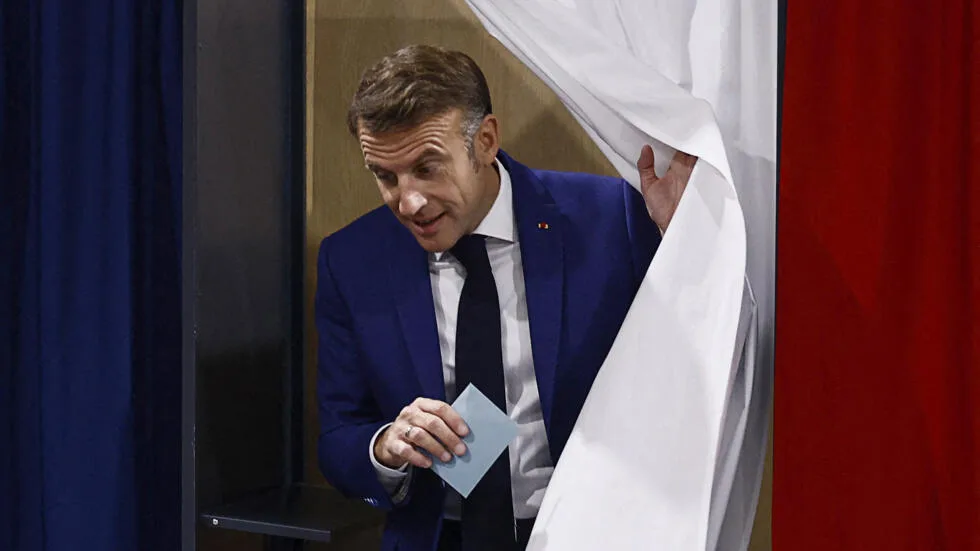Introduction
France’s political landscape is in flux following the first round of parliamentary elections. While President Emmanuel Macron’s centrist coalition remains in the lead, the far-right National Rally, led by Marine Le Pen, has made significant gains. The strong performance of both the National Rally and the left-wing alliance NUPES indicates a fragmentation of the French electorate and a potential challenge to Macron’s hold on power. The outcome of the second round will be crucial in determining the balance of power and the direction of the country for the next five years.
Key Points
1. First Round Results and Implications
The National Rally’s significant gains, the centrist coalition’s struggle to secure a majority, and the rise of NUPES reflect a fragmented electorate and potential governance challenges for Macron.
2. Surge in Support for the National Rally
The National Rally’s surge mirrors a broader trend of right-wing populism gaining traction in France and across Europe, indicating shifting political dynamics.
3. Voter Apathy and High Abstention Rates
High abstention rates highlight widespread political apathy, especially among younger generations, posing challenges for engaging voters and addressing their disillusionment.
Insights
1. Right-Wing Populism Trend
The surge in support for the National Rally reflects a deeper trend of right-wing populism gaining traction in France and across Europe.
2. Legislative Challenges for Macron
Macron’s failure to secure a clear majority in the first round signals potential difficulties in passing his legislative agenda, including controversial pension reforms.
3. Appeal of NUPES
The strong showing of the left-wing alliance NUPES suggests a growing appetite for social justice and environmental policies among the French electorate.
First Round Results and Implications
The first round of the parliamentary elections has set the stage for a potentially transformative period in French politics. The National Rally, led by Marine Le Pen, made significant gains, reflecting a shift towards right-wing populism. Meanwhile, President Emmanuel Macron’s centrist coalition, though still in the lead, faces a tough battle to secure a majority. The emergence of the left-wing alliance NUPES, led by Jean-Luc Mélenchon, as a strong contender further complicates the political landscape. High abstention rates indicate widespread disillusionment among voters, which could influence the final outcome.
Surge in Support for the National Rally
The rise of the National Rally is part of a broader trend of right-wing populism gaining traction in France and across Europe. Le Pen’s party has capitalized on concerns over immigration, national identity, and economic insecurity, resonating with a significant portion of the electorate. This surge reflects a growing divide in French society and a challenge to the traditional political order. If the National Rally continues to gain support, it could significantly impact French and European politics, pushing policies further to the right.
Macron’s Challenges Ahead
President Macron faces significant challenges in the wake of the first round of elections. His centrist coalition’s struggle to secure a majority raises concerns about his ability to pass key legislative measures. Controversial reforms, particularly in pensions, will be difficult to implement without broader support. Macron may need to form coalitions with other parties, which could lead to compromises on his policy agenda. The political fragmentation revealed by these elections highlights the hurdles Macron must overcome to govern effectively in his second term.
The Rise of NUPES
The left-wing alliance NUPES, led by Jean-Luc Mélenchon, has emerged as a significant force in French politics. Their strong showing in the first round suggests a growing appetite for policies focused on social justice and environmental sustainability. NUPES’ appeal to younger voters and those disillusioned with traditional parties indicates a shift towards progressive values. The future prospects of NUPES will depend on their ability to maintain momentum and influence legislative decisions in the coming years.
Voter Apathy and High Abstention Rates
High abstention rates in the first round of elections underscore a significant challenge for French democracy. Many voters, particularly younger generations, are disillusioned with the political system and skeptical of its ability to address their concerns. Engaging these voters and addressing political apathy is crucial for the health of the democratic process. Strategies to increase voter turnout and restore faith in political institutions will be essential in future elections.
Second Round: Key Factors and Predictions
The outcome of the second round will hinge on several key factors, including voter turnout and strategic alliances. The ability of Macron’s coalition to secure a majority will determine the extent of his legislative power. The performance of the National Rally and NUPES will also be critical in shaping the parliamentary landscape. Predictions suggest a closely contested race, with the potential for significant political realignment based on the results.
Broader Political Implications
The first round of elections has highlighted the fragmentation of the French electorate and the challenges facing traditional political parties. This fragmentation could lead to a period of political instability and realignment, with new coalitions and alliances forming. The results also have broader implications for European politics, as France’s direction will influence EU policies and international relations. The rise of populism and the demand for progressive change reflect broader global trends that will continue to shape political landscapes.
Conclusion
France’s parliamentary elections have revealed a deeply divided electorate and significant challenges for President Macron. The gains by the National Rally and the rise of NUPES indicate a rejection of the status quo and a demand for change. The outcome of the second round will be crucial in determining the balance of power and the direction of French politics for the next five years. As the country navigates this period of political flux, the ability of leaders to address voter concerns and build effective coalitions will be paramount.
Frequently Asked Questions (FAQs)
Why has Marine Le Pen’s National Rally gained significant support?
The National Rally’s rise is attributed to its focus on issues such as immigration, national identity, and economic insecurity, which resonate with a significant portion of the electorate.
What challenges does President Macron face following the first round of elections?
Macron faces challenges in securing a majority for his centrist coalition, which is necessary to pass key legislative measures, including controversial pension reforms.
What is the significance of the high abstention rates in the first round?
High abstention rates reflect widespread disillusionment with the political system, particularly among younger voters, highlighting the challenge of engaging the electorate.
How has the left-wing alliance NUPES performed in the elections?
NUPES has emerged as a strong contender, indicating a growing appetite for social justice and environmental policies among the French electorate.
What are the potential outcomes of the second round of elections?
The second round will determine the balance of power in the French parliament, with key factors including voter turnout and strategic alliances influencing the final outcome.
What are the broader political implications of the election results?
The election results indicate a fragmentation of the French electorate and could lead to political instability and realignment, influencing both national and European politics.
External Sources
============================================



